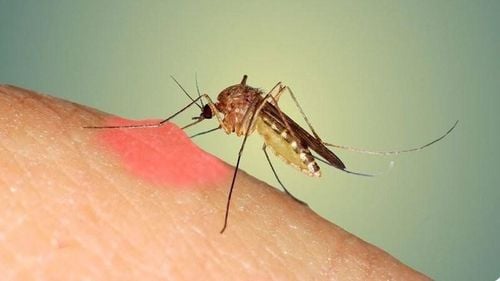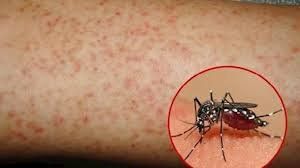This is an automatically translated article.
Dengue fever is a dangerous infectious disease that often breaks out in the rainy season in places with poor sanitation. The mortality rate from dengue fever is quite high and there is currently no specific medicine to treat this disease.
Children are the most susceptible to mosquito attacks because of their hyperactive nature, so children often like to play in dark places, where mosquitoes often choose to operate, so they are easy to catch dengue fever in children. . Symptoms of dengue fever in children are quite typical, but in the early stages can easily be confused with common types of fever.
Some manifestations of dengue fever in children include:
Pediatric patients often have dengue fever with sudden high fever, before that the child is completely healthy, the fever lasts from 2 to 7 days, accompanied by symptoms such as flushing, skin congestion, muscle aches, joint pain, headache. In some cases, children with dengue fever may have a fever along with a sore throat, conjunctivitis, fatigue, nausea, and vomiting. Infants may present with cough, runny nose or diarrhea. At this time, the symptoms of dengue fever in children are often nonspecific, indistinguishable from infection with other viruses. After that, dengue fever may appear in children such as: Appearance of petechiae (red dots that do not disappear when stretching the skin) usually on the forearms, shins, armpits, chest, waist; mucosal bleeding such as nosebleeds, bleeding teeth, bloody stools. In pubertal girls, vaginal bleeding may occur. These hemorrhagic symptoms are rare in the early days. The liver may enlarge after a few days. When a blood count is taken at this time, the results show leukopenia, which is a warning sign of the possibility of dengue hemorrhagic fever. From the 3rd to 7th day of the illness, the child starts to have a fever of about 37.5 - 38 degrees Celsius or lower, some children show warning signs of dengue fever such as lethargy, fatigue, vomiting. severe, abdominal pain, mucosal bleeding, hepatomegaly, or in some cases progressing to hemorrhagic shock with cold hands and feet, light tachycardia, clamped or unmeasured blood pressure. All of the above cases need to be hospitalized immediately and follow the doctor's orders. If the shock state is prolonged, the patient can damage many organs, which can lead to death. There were patients at the time of day 6 or 7 of the disease, the fever was gone and the disease recovered, eating well, especially red itchy rash appeared on the limbs, making parents worried to take the child to the hospital, but the doctors were very careful. The doctor explains that this is recovering. In summary, the number of deaths from dengue in children is increasing year by year, becoming a great concern of many parents. Therefore, parents must pay special attention to their children, when there is any abnormality, they should immediately take the child to the hospital to be examined and treated for dengue fever promptly to avoid complications. unexpected.
Please dial HOTLINE for more information or register for an appointment HERE. Download MyVinmec app to make appointments faster and to manage your bookings easily.













